If you have played Marvel’s Spider-Man 2, you will know Hailey Cooper. She was first introduced in the Spider-Man spin-off Miles Morales, before her role was expanded for Insomniac’s recent sequel.
Hailey is, quite simply, a brilliant character, and one that actress Natasha Ofili brings an incredible warmth and humanity to. Hailey is strong, she is funny, she is kind and she is a supportive friend to Miles. She is also Deaf. Hailey wears hearing aids, she communicates with Miles through American Sign Language (ASL), uses text to speak with those who do not sign and her school has an ASL interpreter on campus.
I sat down with Ofili over Zoom, to talk about the importance of seeing Deaf characters like Hailey in video games, as well as where the medium goes next. We cover everything from how she got the part (before she even knew it was for a Spider-Man game), to sign language consultants, authenticity, chemistry with her castmates and more.
Please note, there will be some minor story spoilers for Marvel’s Spider-Man: Miles Morales and Marvel’s Spider-Man 2 below.
We start by going right back to the beginning. Ofili tells me she auditioned for the role of Hailey back in 2018, when she heard about a developer who was looking for someone to play a Black Deaf character in a video game. All she knew was that this character was called Hailey. There were no other details. But, as a Black Deaf actress, she knew she had to go for it.
To her surprise and delight, Ofili was offered the role of Hailey without a call back. She then found out that she was going to be part of Insomniac’s Spider-Man series. “I was thrilled and blown away by that for sure… I was literally jumping for joy,” she beams. “I couldn’t believe it… it was a really cool opportunity.”
Ofili eventually went into the studio for a full body scan, and the collaborative process of bringing Hailey to life began. Hailey was originally created by Insomniac writer Mary Kenney (who is currently working on Wolverine) for Spider-Man: Miles Morales. Over email, Kenney tells me there simply would be “no Hailey without Natasha”.
“She came up with Hailey’s name sign while we were on set for Miles Morales and gave feedback on ASL in our scripts,” Kenney says. “She brings everything I wanted Hailey to be: warm, passionate, brave, kind. She took words on a page and made them into a complete person, and I’m thrilled to see so many people connect with her.”
Ofili tells me that, initially, the role of Hailey was actually a much smaller part than we know today. “… But on the first day working on set with Nadji [Jeter, who plays Miles Morales], the director during a break stood back and observed us and thought ‘Hmm.’
“He really liked our chemistry, and so they decided to add some things on the day of, just for improv – it was that famous scene with the scarf. They added that. It was not planned.”
The scene in question sees Hailey giving Miles (as Spider-Man) her scarf, to make sure he stays warm. Once this scene had been filmed, the developers saw the potential for Hailey to become a love interest, something that was carried over to the second game (but more on that later).
Ofili wrapped up filming for Hailey in Miles Morales after about three sessions. Insomniac then had plans to hire an additional voice actor for Hailey. However, the studio changed its mind, and asked Ofili if she would be happy doing her own voice work for the part.
“I was so surprised,” Ofili says. “That was a real big win for authenticity. I was so happy [Marvel’s Spider-Man: Miles Morales] had the appropriate representation from the very beginning to the very end.”
Ofili got a voice coach for the part, who was “very very patient” with her. “Some words were difficult for me to pronounce, but again they were really patient with me and everything worked out wonderfully,” she says.
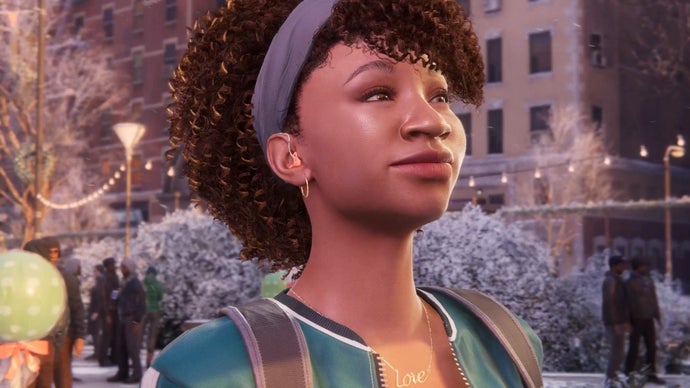
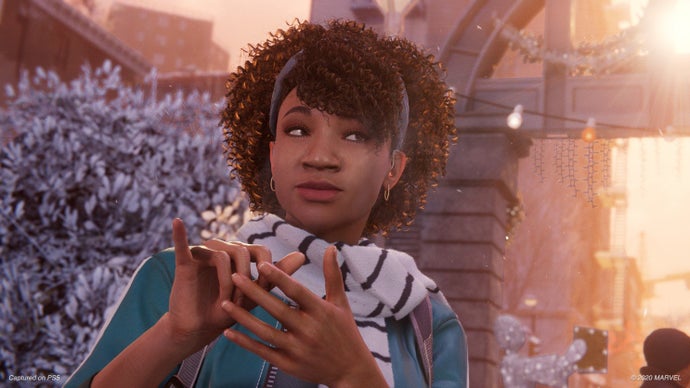
When Marvel’s Spider-Man: Miles Morales ultimately came out, Hailey went viral. Many were thrilled to see a Deaf character so naturally represented in a video game.
“Someone sent me a message, and I was just like ‘what’s going on?!’ And the next thing I know, I am getting tagged on Twitter because of Hailey. I didn’t realise people truly fell in love with Hailey. I was really in awe that everybody loved her and the feedback that was provided in the comments,” Ofili says. “Everyone really felt a connection with her. That human connection, and that really felt so great. And then the second game came along, and they asked me to come back.”
And come back, she did, with Hailey’s role expanded upon even further. “The game had an ASL consultant – Joshua Castille – who was hired from the very beginning, from the very first game. He was phenomenal,” Ofili tells me. Castille sat with Insomniac, and provided feedback to the studio around Deaf culture. Meanwhile, Ofili was also able to give her own tips on the way she signs, how Black Deaf individuals sign, and the way a female signs.
“You have a certain swag to Hailey,” Ofili says. “She’s a New Yorker, so her signing needs to convey all of that. And [Insomniac was] so open. The team was extremely open. They got it right from the beginning to the very end. They really listened.”
This is something that Insomniac advanced writer Brittney Morris, who scripted the character of Hailey for Marvel’s Spider-Man 2, says is essential.
“When writing a character who doesn’t share the writer’s experiences, only 20 percent of the work is actually writing. The other 80 percent is listening,” Morris tells me over email.
“Marvel’s Spider-Man 2 is set in Marvel’s New York, which reflects real-life New York, and you can’t write real-life New York without showing the diverse and colourful people that make it what it is,” she says.
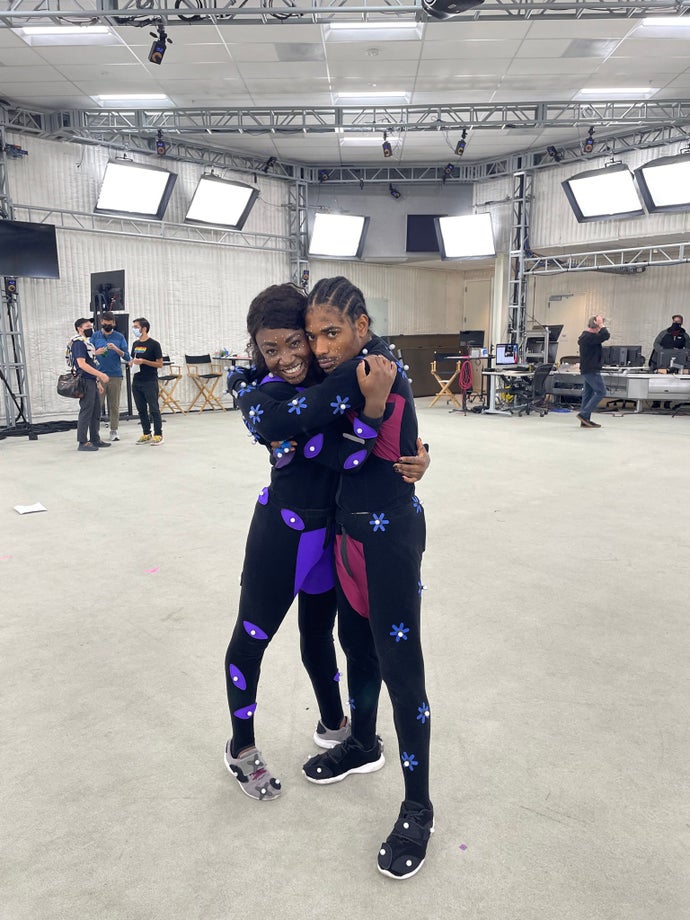
“It was important to include Deaf representation in Marvel’s Spider-Man 2 because Hailey Cooper, a core member of the Spidey-team, is Deaf. She experiences New York in a completely different way from our other characters, just as our Deaf players experience our game in a completely different way. It was important to consider both as we created this game, because we strive to create games that are for everyone.”
Morris continues: “In addition to the expertise of our internal accessibility team, we brought in outside consultants to ensure we were creating an experience that was real and relatable to Deaf players specifically. [Ofili] delivered Hailey’s ASL lines with personality and flavour, breathing life into her character, and pointed out even more opportunities to make Hailey a three-dimensional character. Getting it right was our top priority.”
When Ofili returned for Marvel’s Spider-Man 2, she was also able to improvise during her scenes more. “There’s a bridge scene where Miles and Hailey were walking together, just talking, and Miles was walking too quickly,” Ofili recalls. “It didn’t feel authentic for a Deaf person. Typically, we’ll walk slowly as we are talking. And the director came up to me, and was like ‘ok, we gotta do it again’, and I explained ‘we got to walk a little bit slower as we are talking’.
“But then, we did it, and Miles stopped. But I kept walking, because I was just in the moment and it was a natural thing. Why would I stop at the same time? So, I just kept going, and [Insomniac] really loved it because it was a really natural moment. And, then I looked back and [Miles] had actually stopped because he was taken aback by a phone call. He had just gotten a message on it. But then he became really concerned about Hailey, and it was all improv in that moment on the bridge.
“As an actor, it’s really important to have those moments of improv, and to have those natural feelings and emotions expressed and conveyed. And I feel like that was a really great moment, and the team was really happy with it.”
“Natasha and Nadji took the lines we wrote, interpreted them, and delivered them with their own special touch. They embodied the spirits of Miles and Hailey so perfectly, and their on-screen chemistry shone through in a way that was undeniable,” Morris adds.
“A lot of our lines are ad-libbed and tweaked right there in the booth in real time. We (and the actors) go by what feels right and keep an open mind line by line.”
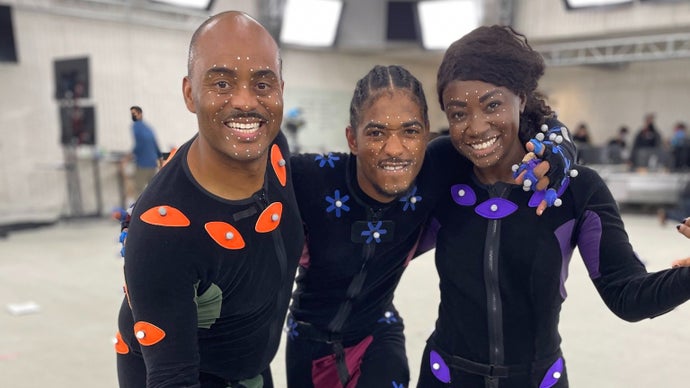
Perhaps the most important moment of Deaf representation, however, happens in an optional side mission, in which players actually take on the role of Hailey. When you play as Hailey during this bespoke mission – known as Graffiti Trouble – the world’s audio becomes muted, simulating hearing loss. In this moment, you are 100 percent Hailey, as she uses her skills as a street artist to fix graffiti smattered around the city. The scenes are muffled. All you can really hear is slight change in the ambiance as traffic passes, or when Hailey uses a spray can.
This section was recently nominated for an award at the GAconf, which recognises and celebrates the efforts across and around game development in order to raise the bar for accessibility. It is brilliant.
This mission was Morris’ idea, but while she may have initiated and advocated its inclusion, she tells me it was a collaborative effort across the team.
“Early in production, I waved a flag and pointed out opportunities to show deeper elements of Hailey’s character and showcase her more in the game, including inviting players to step into her shoes,” she tells me.
“While I offered the initial idea for Hailey’s side mission, it took the entire production team to make Graffiti Trouble really sing. Mission Designer Atsina Corrington added gameplay and puzzle elements that made it feel like a true Spider-Man mission. Senior UI/UX artist Pam Detrich designed the emotes above Hailey’s head that we used in place of inner monologue lines to indicate to players where to go next. Brian Mathison made the initial playable Hailey prototype, and I wrote the dialogue and cinematic action lines.
“It took all of us to make it work, and lots and lots of collaboration.”
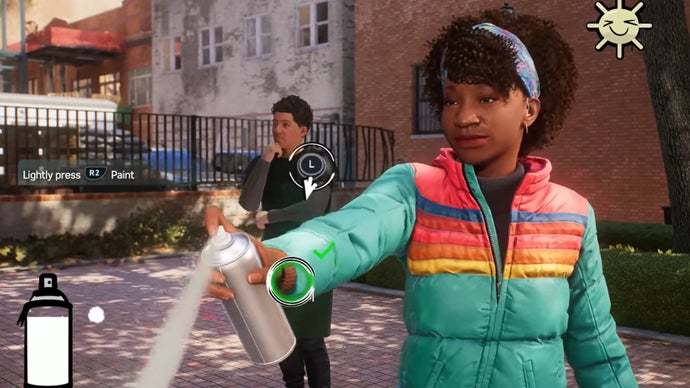
This type of Deaf representation is clearly extremely important to Insomniac, but it is even more important to Ofili. “I feel like a lot of people really don’t know about deafness, or disability in general” she says. “We need to actually see more of that, instead of preaching about it or spoon feeding folks about it.
“Having it in a video game tells it in a way that people can learn about it and see it, and it’s not as scary. You really see these characters in a way where you are able to learn about individual people, disability, deafness. And you see it through the story that is outlined, and I feel like it is so important to do it right – The game being done from the very beginning to the very end, the method of how to speak to a Deaf person, how to use your cell phone to communicate. Some people use hearing aids, some people don’t. Just really showing those various layers, and individuals playing the game being able to learn that, and be open minded and receptive of it. The fact that they didn’t know that, but can still relate to a character like Hailey who is Deaf.
“I got so many DMs and messages and tags saying ‘I love Hailey’ and people really feeling like they resonated with her character. Even though she is Deaf, it didn’t matter. That part was second to her actual being. So, yes, representation is very important.”
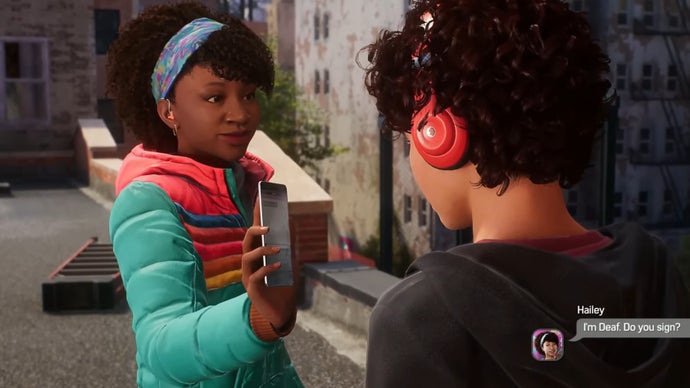
Something that I had never appreciated before was how many different ‘dialects’ of ASL there are. Ofili tells me there are many different “accents” in sign language. “Deaf people from the east coast sign differently than people from the west coast. Accents that come through are different from each region. Some people sign one handed, for example. Then you have BASL, which is Black American Sign Language, and that is also regional and is signed differently depending on where you are. It is really important to embrace those differences of ASL, and the fact that ASL comes in different forms.”
People from the midwest may have a strong southern accent and say “y’all” and it’s the same with ASL, Ofili tells me. “Those accents ring through in their signing. ASL also has such different levels of range, so some people sign more ‘English’, meaning their word order follows a structure of English, and some people are more fluent in ASL and the structure of American Sign Language. As a Deaf person, I have been exposed to so many people within my life, ever since I was two years old, so I can kind of switch my range and how I sign and my dialect into different forms of ASL.”
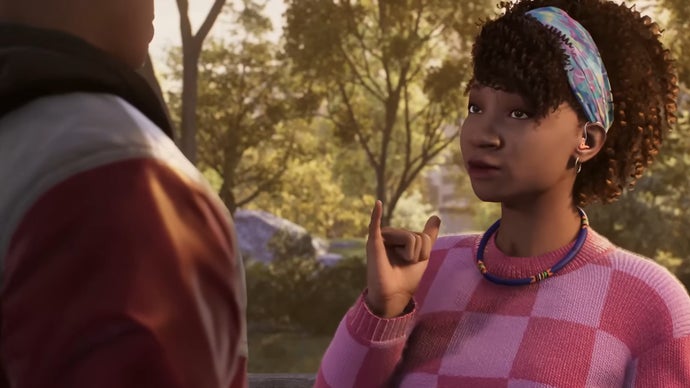
I could talk to Ofili for hours about Deaf representation, but conscious of time we move on to the practicalities of her actual performance. More specifically, those mocap suits. Did she need a suit with more markers on her body to ensure that her signs were picked up as accurately as possible?
“For [Marvel’s Spider-Man: Miles Morales], I had quite a simple type of glove on, but they upgraded it and improved it and figured it out for the second game,” Ofili says. “They figured out, ‘OK, we need a glove and there needs to be additional knobs with tape on each finger’. It was pretty extensive.
“They also had some on my palms, so the hands were obviously the focal point and it was really important to get that right. They also made sure to have more knobs on my body, and they definitely improved that technology with the signing.”
Ofili says she was blown away by the end result, calling it incredible to see Hailey signing in the game. “[Insomniac] did an amazing job, and you know, they are continuing to learn, of course. That is what I really love about the company and the game. They continue to learn and grow, which is beautiful to see.
“They are continuing to evolve, and that is awesome.”
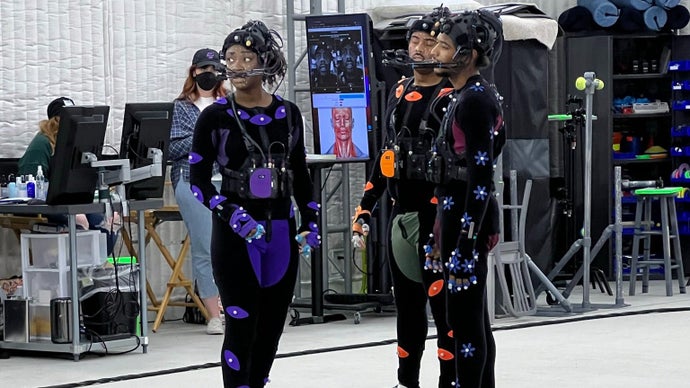
So, what is next for Hailey, and for Deaf representation in video games more generally?
“Hailey has opened a lot of doors, and pathed the way of how to see a Deaf person in the gaming world. I would love to see that expansion of Hailey for sure, fingers crossed,” Ofili tells me. “And having other Deaf characters appear in various games. We could have a sidekick of some sort, you know with Batman and Robin, maybe they know some sign language. We can think, what Deafness can be brought to various characters.
“Walking in Hailey’s shoes, you know she is a graffiti artist and she is really cool and she has got some swag. She shows what it is like to be Deaf, but there are different methods that can be applied to various games, and it’s a wonderful way to really spread that word out, and that word out about Deafness and how we can improve and grow and have those connections with access in the mix.”
This is something Morris also hopes to see in the future. “Video games are a unique medium in their ability to immerse consumers in someone else’s world. I would love to see more games explore the experiences of the disabled, neurodivergent, and otherwise marginalised experiences that real people live every day,” she says.
“We’ve already seen games played entirely from the perspective of characters with other disabilities. Perception, Beyond Eyes, and The Vale are all played from the perspective of blind characters. Why not a Deaf character?
“I love games that take the traditional concept of what a video game is and turn it on its head. Other titles have explored the use of sound as a way to control the environment, using microphone integration to alert nearby enemies of your location, or using mic input to create on-screen puzzle solutions.
“It’s a thrilling time to work in the game industry!”
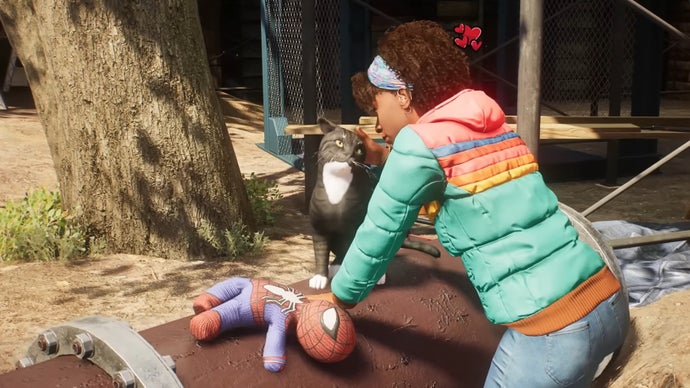
Our time has come to an end all too soon. Ofili’s warmth and enthusiasm for her role in Insomniac’s Spider-Man series is infectious and I can’t help but feel like I have been talking with an old friend, even though I only met Ofili half an hour ago. She simply brings so much joy to the screen.
“I am very grateful for the opportunity to play Hailey,” Ofili tells me as we say our goodbyes. “I am still processing it, you know, but I feel honoured. I really love the gamers. I’ve learned a lot about them, and I love how they have embraced Hailey.
“I am really, really grateful.”
